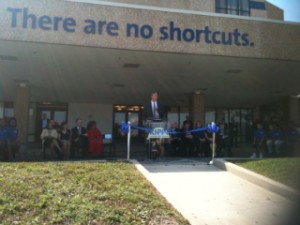One of the most celebrated charter school outfits in the country has yet to hit its stride in Florida. The KIPP Impact Middle School in Jacksonville saw its school grade fall from a B to a C this year, and it was spared from sliding further by a state “safety net.”

Still, organizers are optimistic that great things are still to come.
“There is a sort of tortoise and hare component to this work,’’ said KIPP Jacksonville Executive Director Tom Majdanics. “We realize we certainly have a lot more work to do, but we’re still in the early innings.’’
KIPP (Knowledge Is Power Program) schools are nationally renowned for focusing on high-poverty students and setting the bar high for academic success. When the Jacksonville KIPP opened in 2010 to 80 fifth-graders – a model favored by KIPP – U.S. Secretary of Education Arne Duncan cut the ribbon.
“I want every child in the country to have these kinds of opportunities, where there are such high expectations, where there’s a college going culture from day one,’’ he said at the time.

Despite the high hopes, the school ended its first year with an F. The next year, it rebounded to a B, with progress fueled in large part by big learning gains for sixth-graders in reading and math. But even with those sixth-graders moving on to seventh-grade last year, KIPP fell to a C.
The school would have earned a D without a provision the state Board of Education passed in July to keep schools from falling more than one letter grade. Gary Chartrand, BOE chairman, is a member of the KIPP Impact board of director and helped bring the school to Florida.
The cushion affected hundreds of schools, with district schools benefitting at a higher rate than charters.
“We still made gains, but not as eye-popping as the year before,’’ said Majdanics, who noted a few factors that influenced the grade.
Because KIPP Impact didn’t have eighth-graders last year, school grading rules required it be given the average writing score for the school district it’s located in – and Majdanics suggested KIPP would have scored higher. The school also didn’t have the opportunity to earn extra points, like other middle schools did, by enrolling eighth-graders in Algebra I.
“That would have been a healthy boost to our grade’’ and landed the school a solid C without the safety net, Majdanics said.
Regardless, he said, it has never been the KIPP way to focus on one year’s grade. “Ultimately, our goal is preparing kids for college,’’ said Majdanics, who also serves on the board of the Florida Charter School Alliance. Passing the FCAT is important, but it doesn’t mean a student is ready to make it to and through college, he said. KIPP believes students need a strong foundation in college-ready habits and character development for college success.
KIPP Impact heads into the new school year with 353 students. A top goal: Getting two-thirds of the eighth-grade class to pass the Algebra I end-of-course exam. That would open doors to some of the communities’ best high schools.
KIPP also has an elementary school in Jacksonville, KIPP VOICE, which opened last fall with kindergarten. This year, there will be 197 students in K-1 with plans to add a grade level each year until the school reaches fourth grade.
Editor’s note: This story has been updated to clarify a comment about the FCAT that KIPP Jacksonville Executive Director Tom Majdanics said was taken out of context.



I wish KIPP well but I also wish the author would have mentioned how their school day is longer and that they spend more per pupil than public schools do too.